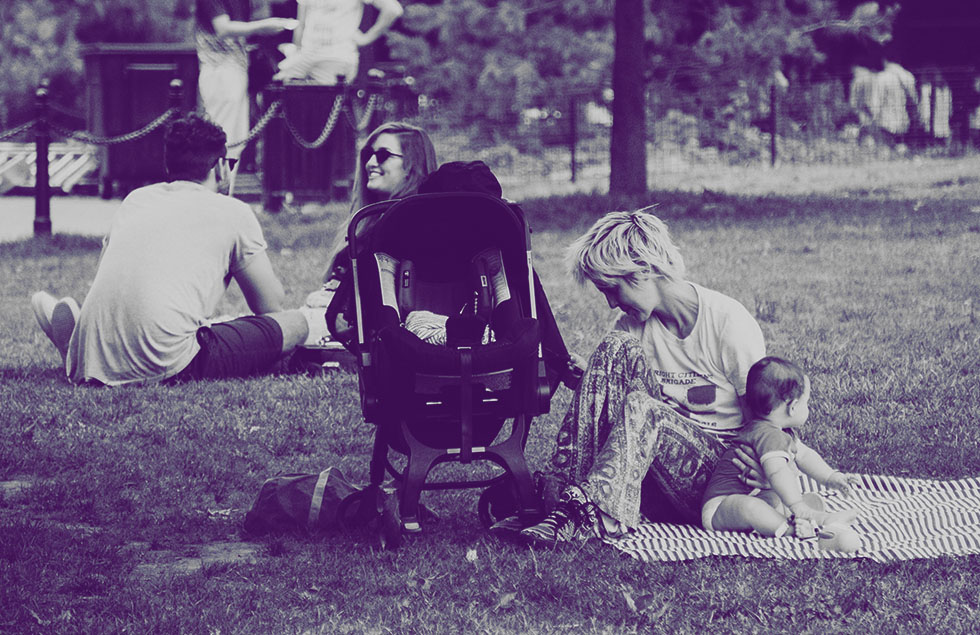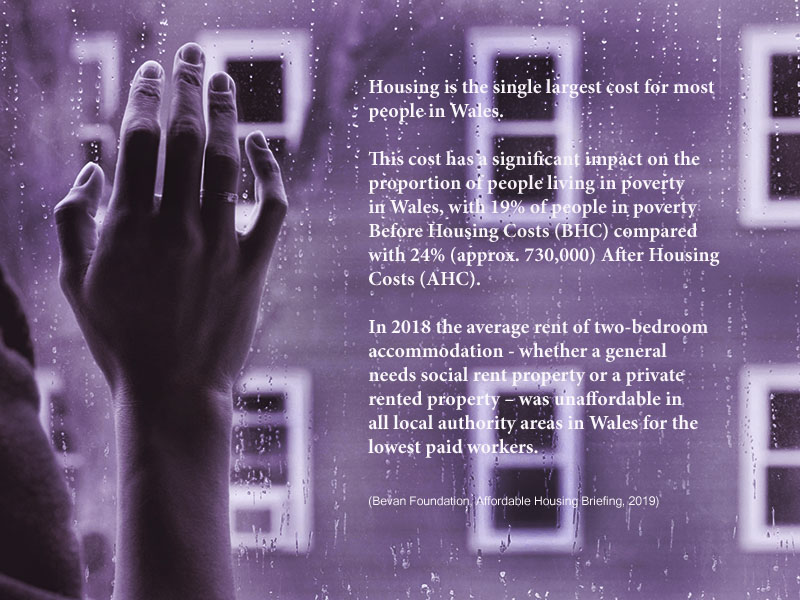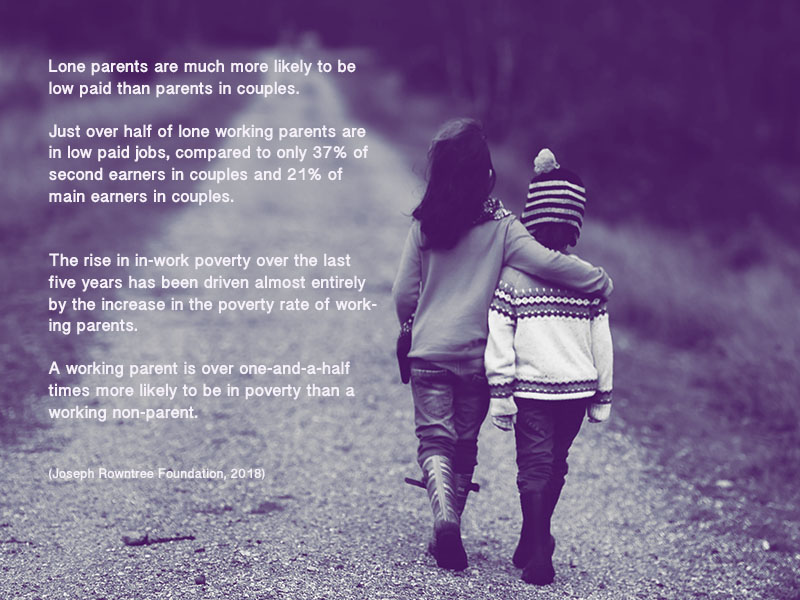Sidebars and ‘shame’
Single mothers can face multiple issues of stigma and being shamed for their circumstances.
Poverty in itself often carries a stigma. Oxfam Cymru says that those living in poverty are often stigmatised as being “idle, workshy feckless, scroungers, shirkers and cheats.”
For single mothers in poverty, this stigma can be magnified with judgements about their status as a lone parent – something which has been highlighted during the 2019 election campaign.
Newspaper columns by Boris Johnson, written during his time at The Spectator, were unearthed, where he said single mothers were raising, “ill-raised, ignorant, aggressive and illegitimate children.”
The comments prompted a reaction from politicians and members of the public who have experienced being a single mother. Angela Raynor, shadow health secretary, spoke about her time as a young single mother, saying, “I think it’s absolutely disgusting. I remember people like that making those comments about me.”
A single mother also called into LBC radio station to challenge Boris Johnson directly:
Single mum Ruth calling in to speak to Boris Johnson on LBC just now has just annihilated him in two sentences: “I’m a single mother. I don’t appreciate what you’ve said about single mothers and, by implication, my family.” #GE2019 pic.twitter.com/HnasGsE5e5
— Sarah #VoteLabour 🌹 (@ScouseGirlMedia) November 29, 2019
Even though the prime minister’s comments were written in 1995, some responses to the reported comments show that in some sections of society attitudes are still highly negative to single mothers.
The top-rated comment of an article about the prime minister’s comments on the DailyMailOnline, for example, repeats a decades-old stigma that women (especially younger women) get pregnant as a financial lifestyle choice.

Samantha Harris, 27, Cardiff, says, “my biggest issue with being a single parent is the judgement on why I am a single mother even though the reasons leading to my situation were completely out of my control.”
Other mothers report feeling judged for not having a father figure around, or for working while parenting. One mother, who wished to remain anonymous, said she often felt she was being pitied or looked down on for being a single mother.
For many women, becoming a single parent is incredibly painful. What happens when this choice means facing poverty?

Having to use a food bank. Being unable to pay the mortgage. Coping with unaffordable childcare. Living on next to nothing while waiting for benefits to be assessed. Piecing back finances after economic abuse.
What do all these people have in common?
These are the experiences of mothers facing poverty after leaving a relationship – and who continue, often for years, to struggle to survive financially. For many women, especially those in abusive relationships, finding independence is already challenging.
But what happens when poverty is added to the pressures of single parenting?
Parenting in poverty
Of households that are in material deprivation in Wales, single parents make up the biggest demographic. A staggering 49% of single parents are materially deprived. Around 90% of all single parents are women, and they often bear the brunt of financial hardship post-separation.
Source: National Survey for Wales 2017-18 Poverty and Deprivation.
Of these hardships, securing adequate housing is often the most difficult.
Housing headaches
Dr Steffan Evans is the policy and research officer at the Bevan Foundation, a Welsh independent thinktank that researches poverty, injustice and inequality.
Steffan says that housing costs don’t always reflect the characteristics of the property. “If you rent a two-bedroom property, the cost of living there is the same whether you are a single parent or if you live as a couple. So that puts extra pressure on women in that situation,” he explains.

Women are more likely to be in low-paid and part-time work, making it even harder for them to afford rental prices on many properties, says Steffan – a problem highlighted in more affluent areas such as Cardiff.
The Bevan Foundation found that rent on a two-bedroom privately-owned property in Cardiff accounted for more than half the gross weekly earnings of low-paid workers.
Social rents were slightly less costly at one-third of earnings. But social housing waiting lists are often long; over 10,000 people are currently on the waiting list in Cardiff, and the list receives around 700 new applications each month.
Constant financial anxiety
Staying in a mortgaged property is not always a guarantee of financial stability.
Lucy Green, 47, who runs her own cleaning business in Carmarthen, struggled after she asked her abusive partner to leave.
“The day he left, he literally walked out of the door and said he wasn’t providing any income for me and our daughter. He stopped every direct debit on that day,” she says. Lucy was unable to access benefit payments because she did not work the required 16 hours, and part-time work combined with maternity leave had left her without enough National Insurance contributions.
In desperation, she visited Women’s Aid, the national charity supporting women who are victims of abuse and domestic violence.
They gave her a counselling session and an emergency food parcel which helped her to focus on finding more working hours.

It was a similar situation for Emma Gibson, 36, from Newbridge. After she left her ex she had to rely on family support to survive.
“I had nothing for two months while I looked for work, and waited for Universal Credit to kick in,” she says.
Though she now has employment she feels constant financial anxiety. She explains, “I work part-time, and I never know from one month to the next what I will be earning. I try and save money every month just in case, but I have to watch every penny.”
Fear of financial implications
For women in abusive relationships, financial difficulties can be magnified. A 2019 Women’s Aid report found that the fear of the financial implications of leaving made some women stay in abusive relationships for longer than they would have done if they had had financial independence.
Sophie Weeks, media & external relations officer, Welsh Women’s Aid, says, “economic abuse can create many barriers to a woman leaving a relationship – if a victim is economically dependent on the perpetrator, it may restrict her ability to leave safely.”
There are also concerns about a post-Brexit landscape for women in abusive relationships. Welsh Women’s Aid is concerned about the potential impact of Brexit on women who are survivors of violence in Wales.
They say that an increase in the cost of living after Brexit is likely to lead to “reduced financial capacity for survivors to leave an abusive partner as well as impacting on their ability to move on and build a life free from abuse.”
For researchers such as Steffan, policy changes could ease the burden. “Universal Credit is paid to a household and the evidence is that men predominantly tend to have control over the household money and bank accounts,” says Steffan. “From a policy point of view, there’s absolutely a need to look at how we can get money to women directly.”
Juggling poverty pressures
In-work poverty is a reality for many single mums. Insecure and expensive childcare can be a barrier to working.
“The first years are precious and are being stolen just to survive.”
For women like Samantha Harris, 27, from Newport, there is added strain of juggling caring with earning enough to live on.
She says, “I’m not against working, I just hate that mothers have to pick between missing their child’s first words, and putting food on the table. The first years are precious and are being stolen just to survive.”
These choices paint an often stark picture of the pressures women face when they become single parents. Whether it’s difficulties with childcare, living hand-to-mouth on insecure benefit payments or struggling after leaving an abusive relationship – poverty continues to present unique and complex challenges for mothers in Wales today.
Sidebars and ‘shame’
Single mothers can face multiple issues of stigma and being shamed for their circumstances.
Poverty in itself often carries a stigma. Oxfam Cymru says that those living in poverty are often stigmatised as being “idle, workshy feckless, scroungers, shirkers and cheats.”
For single mothers in poverty, this stigma can be magnified with judgements about their status as a lone parent – something which has been highlighted during the 2019 election campaign.
Newspaper columns by Boris Johnson, written during his time at The Spectator, were unearthed, where he said single mothers were raising, “ill-raised, ignorant, aggressive and illegitimate children.”
The comments prompted a reaction from politicians and members of the public who have experienced being a single mother. Angela Raynor, shadow health secretary, spoke about her time as a young single mother, saying, “I think it’s absolutely disgusting. I remember people like that making those comments about me.”
A single mother also called into LBC radio station to challenge Boris Johnson directly:
Single mum Ruth calling in to speak to Boris Johnson on LBC just now has just annihilated him in two sentences: “I’m a single mother. I don’t appreciate what you’ve said about single mothers and, by implication, my family.” #GE2019 pic.twitter.com/HnasGsE5e5
— Sarah #VoteLabour 🌹 (@ScouseGirlMedia) November 29, 2019
Even though the prime minister’s comments were written in 1995, some responses to the reported comments show that in some sections of society attitudes are still highly negative to single mothers.
The top-rated comment of an article about the prime minister’s comments on the DailyMailOnline, for example, repeats a decades-old stigma that women (especially younger women) get pregnant as a financial lifestyle choice.

Samantha Harris, 27, Cardiff, says, “my biggest issue with being a single parent is the judgement on why I am a single mother even though the reasons leading to my situation were completely out of my control.”
Other mothers report feeling judged for not having a father figure around, or for working while parenting. One mother, who wished to remain anonymous, said she often felt she was being pitied or looked down on for being a single mother.

